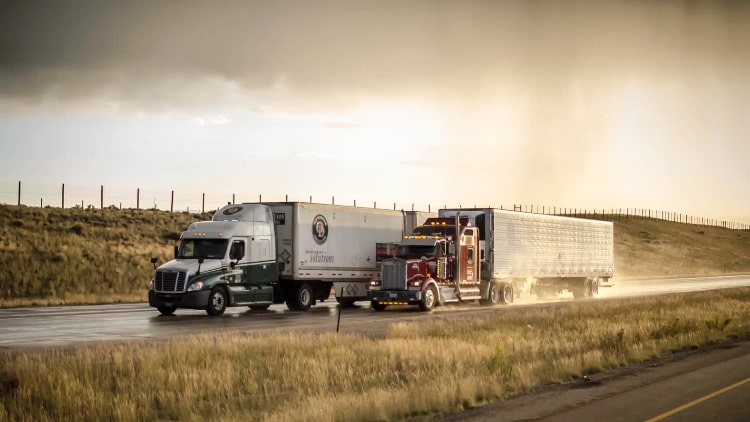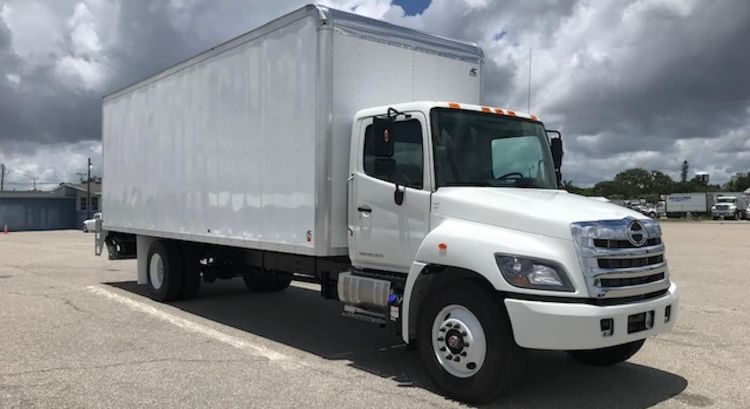Want to know all about short haul trucking? Interested in becoming a short haul truck driver? Here’s everything you need to know.
What is Short Haul Trucking?

Short haul trucking is a form of freight transportation in which loads are moved within a limited geographical area, usually within 150 mile radius and within the same state. Long haul trucking or over-the-road (OTR) involves driving a truck over a longer stretch, typically about 500 miles per day.
Because short distance hauling tends to involve more frequent and shorter trips than long-haul trucking, short distance truck drivers are home more compared to long-haulers who can be on the road for weeks at a time.
Why is There a Demand for Short Haul Trucking?
There is a high demand for short haul truckers due to the need for quick and reliable delivery of goods over short distances. With the growing e-commerce sales, bulk orders, and the need to meet deadlines rapidly have increased the demand for experienced short distance truckers who can deliver within a day or two.
According to the US Census Bureau, the total e-commerce sales for 2022 were estimated at $1,034.1 billion, an increase of 7.7 percent (±0.4%) from 2021. And from 2012 to 2022, the annual US e-commerce sales grew nearly five times, rising at an average annual growth rate of 16.4%.
And according to Statista data, the revenue in the e-commerce industry in the United States was forecast to continuously increase between 2023 and 2027 by a total of 551.9 billion U.S. dollars (+54.59 %).
To satisfy consumer demand, regional and local trucking companies have expanded their services to cover larger areas with more frequent deliveries. With shorter routes, businesses can save money on fuel costs while still ensuring that their shipments are delivered on time.
Also, according to BLS.gov, job outlook for short haul truckers, categorized under Heavy and Tractor-trailer Truck Drivers, is projected to increase 4% from 2022 to 2032. And each year, there’s a projected 241,000 job openings for heavy and tractor-trailer drivers through 2031.
In addition, the average age of truck drivers is 47 years old according to Zippia. We averaged the age data of other professions from BLS.gov, which came to 42 years old. As older drivers retire, more jobs will open up.
If you’re considering a career as a short haul truck driver, there’s plenty of employment opportunities for you given the consumer demand and shortage of truckers.
Types of Short Haul Trucking
Short distance hauling can typically be categorized into 1) Regional Trucking and 2) Local Trucking. Local trucking involves transporting goods within a single city or state while regional trucking involves transporting goods across multiple states. Local truckers usually make frequent stops and their trips are often shorter in duration compared to regional truckers who cover longer distances and spend more time on the road. Regional truckers may also require additional certifications due to crossing state lines.
Regional Trucking

Regional trucking involves transporting cargo from one city to another or across multiple states on a regular basis. Most regional routes cover an average distance of up to 500 miles; however, some may be as short as 200 miles.
Typically, regional truckers operate tractor-trailers covering larger distances on highways compared to local truckers who stick to a smaller footprint.
Given the amount of miles regional truckers cover, they’re often away from home for days at a time, however, they’re usually home by the end of each week.
Local Trucking
Local trucking is used for smaller shipments that need to reach their destination within a day or two; generally, local truckers will travel up to 100 miles from their starting point. Typically they’re maneuvering city streets in straight trucks instead of tractor-trailers.
Benefits of Becoming a Short Haul Truck Driver
Aside from a positive job outlook for short distance truck drivers, there are other benefits to pursuing a career as a short hauler driver.
Work Life Balance
Because short haul trucking usually involves fewer hours on the road, drivers can enjoy a better work-life balance. Short haulers are away from home less compared to long haul truckers, and are less prone to issues like loneliness. Short distance truckers can establish a routine, pursue hobbies and interests, and spend more time with families and friends given they’re less on the road compared to OTR drivers.
Road Familiarity
Short haul trucking can be an attractive career choice for many truck drivers, since it offers various advantages. Road familiarity is one of the important benefits of short haul jobs since drivers frequently traverse the same routes and develop a better understanding of the terrain.
ELD Exemptions
Moreover, short hauling provides some exemptions from Electronic Logging Devices (ELDs) regulations, allowing more flexibility in managing time on the road.
Lower Expenses
Another advantage is that shorter trips mean less wear and tear on your vehicle, which translates into lower expenses due to maintenance costs and fuel.
Challenges of Short Haul Trucking

Juggling Multiple Routes
However, being a short haul driver comes with its own challenges. One of the drawbacks is that multiple routes can be difficult to juggle when driving over short distances as it requires you to plan and optimize your schedule in order to pick up and deliver all assigned loads within their respective time frames.
Meeting Client Expectations
Additionally, meeting client expectations can be challenging since delays are more noticeable when dealing with shorter trips; this includes both loading dock and asset tracking delays.
Loading Dock and Asset Tracking Delays
Unfortunately asset tracking delays are a common occurrence for short haul trucking. This happens when loading docks and assets don’t have the proper equipment (such as GPS systems or two-way radios) to track deliveries. As a result, truck drivers must wait for their orders to be ready before they can move on to the next destination, resulting in lost time and money.
Moreover, loading dock delays can also lead to missed delivery deadlines and other issues that can affect customer satisfaction.
Loneliness vs. Social Interaction on the Road
Furthermore, shorter hauling jobs, especially local trucking jobs, require greater social interaction during stops for restocking supplies or refueling, which might be uncomfortable for some people who prefer loneliness and peace on the road.
On the other hand, regional truck drivers who spend longer days on the road may face the challenge of loneliness.
How to Become a Short Haul Truck Driver

If you are looking to become a short haul truck driver, the process is similar to becoming a long-haul driver. The first step will be obtaining your Commercial Driver’s License (CDL), which requires passing tests for both written knowledge and practical driving skills.
To drive across states, you need to be at least 21 years of age. And we recommend you get the Class A license, which gives you the most flexibility and job opportunities.
You’ll need to successfully complete the mandatory Entry-level Driver Training (ELDT) before you book your road test. And once you complete all the requirements, your local DMV or DOT will issue a CDL.
You can then apply for jobs with different companies that offer short haul services; find out more about their requirements and available positions on their websites or through job boards such as Truckers Report and Indeed.
| Steps to Get a CDL | |
| 1. Pass the knowledge / written test | |
| 2. Get Commercial License Permit (CLP) - you will be issued a CLP when you pass the written test. | |
| 3. Complete the mandatory Entry-Level Driver Training (ELDT) | |
| 4. Pass the skills test: pre-trip inspection + on-road driving | |
| 5. Get your CDL - you will be issued a CDL when you successfully meet above requirements. |
Short Haul vs. Long Haul

When deciding between short haul vs long haul trucking, it is important to consider the pros and cons of each option in order to make an informed decision. Short hauling usually involves less time on the road and lower expenses but also demands better planning for multiple routes and more social interaction. On the other hand, long-haul trucking has its own advantages such as higher salaries and less frequent stops for refueling or restocking; however, it can be more exhausting due to fewer opportunities of rest and longer hours on the road.
In conclusion, short haul trucking can be an attractive career choice for many experienced drivers due to its lower expenses, exemptions from ELDs regulations, better work-life balance, and road familiarity. However, there are certain challenges associated with this profession that need to be taken into consideration before making a decision. With adequate preparation and experience, short hauling jobs offer rewarding professional experiences that can help you establish yourself in the trucking industry.

Marina was in corporate communications for over 15 years before becoming a freelance writer for TruckersTraining.com. She's been writing about transportation, and the supply chain and trucking industry for over five years. Her father was in the trucking and logging business which exposed her to the industry. Her passions include travel, nature and entrepreneurship.


